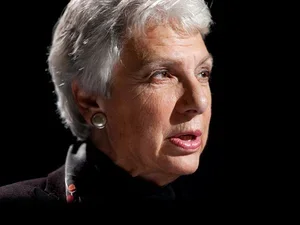President Coleman Speaks at TED2009 Conference
Bennington College President Elizabeth Coleman joined Al Gore, Bill Gates, Herbie Hancock, and other leading innovators in speaking at the 25th annual Technology, Entertainment, Design (TED) Conference, a highly anticipated four-day event that challenged some of the world's forward-most thinkers to deliver "the talk of their lives in 18 minutes."

President Coleman was a featured speaker on February 7 as part of TED's 25th anniversary celebration at its new facility in Long Beach, California.
Past speakers have included President Bill Clinton, primatologist Jane Goodall, author Michael Pollan '76, musician Paul Simon, cellist Yo Yo Ma, and many others. Collectively, they have won every major prize awarded for excellence, including the Nobel, Pritzker, Pulitzer, Oscar, Grammy, Emmy, Tony, and MacArthur "genius" grant.
According to the San Francisco Chronicle, the TED Conference "forces the movers and shakers of the world to confront the questions right in front of us. Who are we? Where are we going? How can we fix it?... for the vast majority of us locked in the day-to-day struggle to survive, perform, cope, this kind of discussion is a wildly refreshing reminder of what's important."
President Coleman discussed the need for U.S. educational institutions to awaken a sense of active citizenry in students—the very concept driving Bennington's new initiative to make civic engagement central to its curriculum.
President Coleman the new initiative on Vermont Public Radio.
"Insofar as citizenship is taught in schools," she said during a 2007 speech at Bennington's 75th anniversary celebration "the student's relationship to government is reduced to that of being a passive spectator, learning the workings of its machinery. The only activity called for is somehow to remember how government works, for reasons that do not include using it oneself or otherwise influencing it. At best one learns how to keep score. This is a devastating loss when we consider that educational institutions are uniquely capable of providing an especially fertile soil for the growing of citizens."